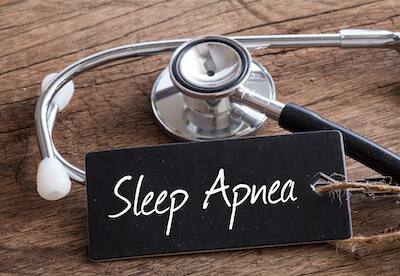
Are You Suffering From Sleep Apnea?
Do you find yourself waking up choking or gasping for air? Or are you tired and frustrated throughout the day? You might have sleep apnea. Even though
85% of sleep apnea cases go undiagnosed, it’s a dangerous disorder that can lead to serious health consequences.
In addition to waking up choking or gasping for air, there are various symptoms that indicate you might have sleep apnea, including:
Irritability
Lack of energy
Excessive fatigue
Impaired memory
Loud snoring
Reduced libido
Observed episodes where breathing suddenly stops or starts
Insomnia
Frequent urination at night
You may not realize you have sleep apnea, but your partner might be the one who notices the symptoms. It’s important not to ignore the warning signs so you can start treatment right away.
The Two Types of Sleep Apnea
Sleep apnea is the sudden stopping and starting of breathing throughout the night.
Obstructive sleep apnea, known as OSA, occurs when breathing stops due to an airway obstruction in your throat. When you sleep, your tongue and soft tissue surrounding your throat relax which can block your airway.
The less common form of sleep apnea
central sleep apnea (CSA), occurs when your brain isn’t sending the proper signals to the body to breathe during sleep. This form of sleep apnea is typically caused by underlying health conditions and follows a different treatment course.
Risk Factors of Sleep Apnea
While anyone can have sleep apnea, there are a few risk factors that may increase your chances of developing the disorder, including:
Sex - men are more likely to have the disorder
Age - older patients are at a greater risk
Smoking
Obesity
Family history
Asthma
Narrowed airway
Sleep Apnea and Your Quality of Life
If you suffer from sleep apnea, it impacts nearly every aspect of your life and leads to serious long-term health consequences. Sleep apnea has been linked to high blood pressure, heart disease, and strokes. The effects of sleep apnea can also lead to weight gain which increases the severity of the disorder. Repeatedly losing oxygen throughout the night has been linked to dementia and Alzheimer’s disease.
If you have sleep apnea, it’s vital to seek help so you can begin experiencing the benefits of a healthy night’s rest.
Frequently Asked Questions
How is sleep apnea diagnosed?
Sleep apnea is diagnosed with a sleep study. A sleep study can be performed in the comfort of your own home or in a lab under the supervision of a physician.
With the take-home test, you’ll receive the sleep test equipment from your physician and return it to them after you’ve conducted the test. The equipment will monitor your heart rate and breathing, as well as the oxygen level in your blood.
Once your physician diagnoses you with sleep apnea, Dr. Katz can help you find a treatment option that suits you.
Are sleep apnea and snoring the same thing?
Most people who have sleep apnea snore, but not all people who snore have sleep apnea. Loud and frequent snoring is one of the most common and noticeable signs of sleep apnea. If you snore, we highly recommend you undergo a sleep study to determine if, in fact, you have sleep apnea.
Once you’re diagnosed with sleep apnea, we can begin treatment immediately. Whether you have sleep apnea, or simply snore, we’ll assist you with treatment so you and your partner can start enjoying restful nights.
Does oral appliance therapy work?
Yes! Oral appliance therapy is a quiet, convenient, and comfortable way to tackle snoring and sleep apnea symptoms. It’s a custom-fitted oral device that works by gently repositioning the tongue or jaw to eliminate any obstructions in the airway.
With oral appliance therapy, Dr. Katz can help improve your sleep, restore your energy, and benefit your overall health. If you suffer from sleep apnea, schedule a consultation with Dr. Katz by contacting our Greensboro office at
(336) 286-5800 or our Eden office at
(336) 627-1537.
During the consultation, Dr. Katz will examine your head and neck function, the roof of your mouth, throat, tongue, neck, posture, body mass, and your nasal septum to look for any areas that may cause an airway obstruction. He’ll determine if you would benefit from a sleep study so you can begin treatment right away.
Is there a cure for sleep apnea?
The only cure for sleep apnea is to have surgery. However, surgery is invasive and only used in the most severe cases as a last resort. As a first line of defense, we’ll typically suggest an oral appliance to begin reversing the effects of sleep apnea. In addition to treating sleep apnea with an oral appliance, Dr. Katz may recommend certain lifestyle changes to ensure the treatment is effective.